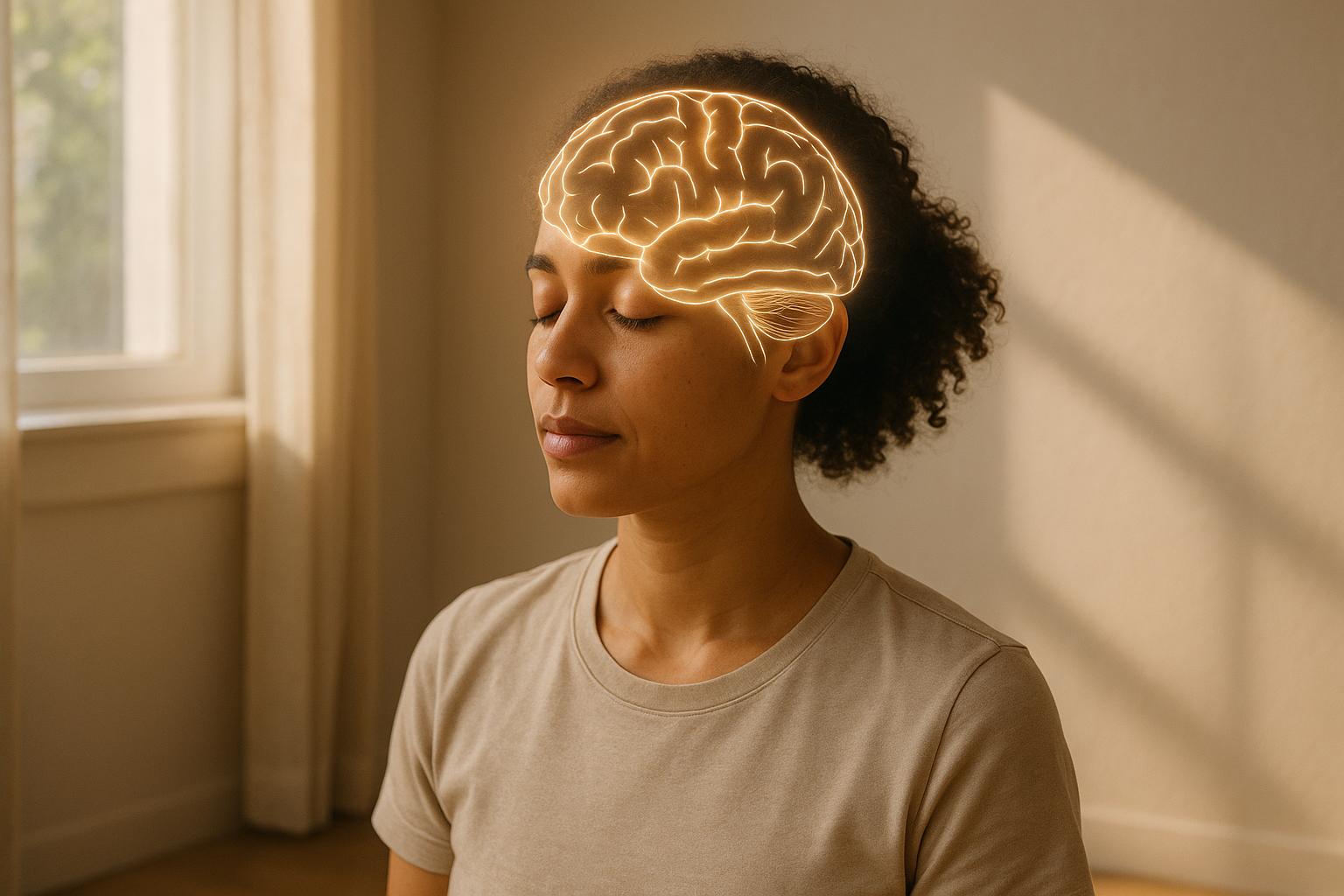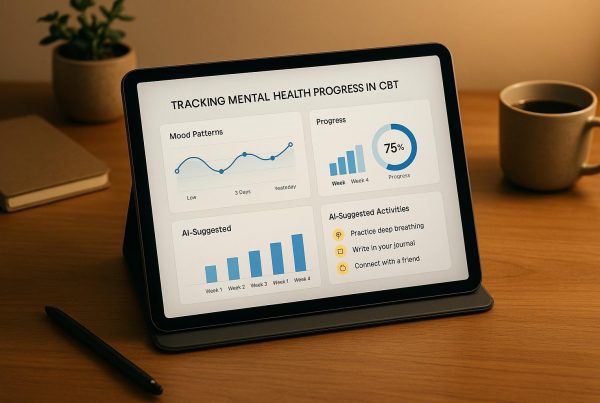Mindfulness isn’t just about relaxation – it actively rewires your brain. Studies show it increases gray matter in areas tied to memory and empathy, reduces stress-related amygdala activity, and strengthens focus, emotional control, and resilience. Here’s a quick breakdown:
- What It Does: Boosts memory, sharpens focus, and reduces stress.
- Key Brain Areas Impacted: Prefrontal cortex (decision-making), amygdala (stress response), hippocampus (memory), and more.
- How It Works: Regular practice reshapes neural pathways through neuroplasticity, improving brain connectivity and function.
- Results: Better emotional balance, enhanced learning, and even slowed age-related brain decline.
Mindfulness is not just a practice – it’s a tool to transform mental and emotional well-being. Read on to learn how it works and how you can integrate it into your life.
Neuroplasticity – How Mindfulness Reshapes The Brain | Dr Sara Lazar
How Mindfulness Changes the Brain
Practicing mindfulness regularly doesn’t just change the way you feel – it actually reshapes your brain. Using advanced brain imaging technology, researchers have been able to observe these changes and measure their impact.
Neuroplasticity: The Brain’s Ability to Adapt
One of the most fascinating aspects of the brain is its neuroplasticity – its ability to reorganize and form new connections based on experience. Dr. Amishi Jha, Associate Professor in the Department of Psychology at the University of Miami, describes it this way:
"Neuroplasticity is the capacity of the brain to reorganize its connections based on experience… It’s very much related to something exciting we learned about just a couple of decades ago called neurogenesis, which means that even the adult brain can grow new neurons" [4].
Mindfulness meditation taps into this adaptability in profound ways. Studies show that regular mindfulness practice can lead to structural changes in the brain, such as increased cortical thickness in areas tied to emotional regulation and sensory processing. It also helps slow down the natural thinning of the cortex that comes with aging [3] [4]. In essence, mindfulness strengthens the brain’s neural pathways.
And these changes don’t take long to appear. Research has found that individuals participating in mindfulness programs lasting just 4 to 8 weeks experience noticeable shifts in brain activity. The brain’s focus and awareness networks become more active, while the default mode network – responsible for mind-wandering – becomes less dominant [4].
These adaptations set the stage for specific changes in key brain regions.
Key Brain Regions Affected by Mindfulness
Mindfulness doesn’t just influence the brain as a whole – it targets specific areas that are essential for mental clarity and emotional balance:
- Prefrontal Cortex (PFC): Often referred to as the brain’s CEO, the PFC is responsible for decision-making, attention, and self-control [6]. Regular mindfulness practice has been shown to enhance activity and gray matter density in this region, improving impulse control and planning abilities [6].
- Amygdala: Known as the brain’s alarm system, the amygdala is constantly on the lookout for threats and triggers stress responses [6]. Mindfulness can reduce the size and reactivity of the amygdala, helping you stay calmer under stress. Long-term meditators, in particular, show lower amygdala activation in stressful situations [3] [7].
- Hippocampus: This area plays a critical role in forming memories and regulating emotions [6]. Meditation has been linked to an increase in hippocampal size, which supports learning, memory, and emotional balance [7].
- Anterior Cingulate Cortex (ACC): The ACC is key for attention and self-regulation [3]. Mindfulness practice enhances activity in this region, improving your ability to focus and manage your emotions [8].
- Insula: The insula helps you tune into physical sensations and emotional signals [5]. Mindfulness training has been associated with heightened activity in the anterior insula, enabling better awareness of your body and emotions before they become overwhelming [5].
- Default Mode Network (DMN): This network activates when your mind wanders or engages in self-referential thinking [6]. Meditation reduces DMN activity, encouraging present-moment awareness and decreasing rumination [6].
Strengthening Brain Networks and Connectivity
Mindfulness doesn’t just change individual brain regions – it enhances the way these regions communicate with one another. Research suggests that mindfulness strengthens functional connectivity across the brain [3], improving its internal communication system.
For example, mindfulness enhances the efficiency of three key networks: the executive control network, which manages attention and cognitive control; the salience network, which helps prioritize what deserves your focus; and the default mode network. These changes lead to improved focus, emotional processing, and situational awareness [9].
Mindfulness also appears to recalibrate how the brain’s attention networks and the insula work together, improving both general and interoceptive attention (your awareness of internal body states) [5]. As Dr. Jha explains:
"What allows people to have better emotion regulation? It comes down to better attentional control" [4].
This enhanced connectivity within the brain makes it easier to break free from negative thought patterns and respond thoughtfully instead of reacting impulsively.
On a biochemical level, mindfulness impacts neurotransmitters like GABA, serotonin, and brain-derived neurotrophic factor (BDNF), which influence mood, anxiety, and brain growth [3]. These changes create a biological foundation for the mental health benefits often reported by mindfulness practitioners.
Through regular practice, mindfulness doesn’t just train your brain temporarily – it rewires it to operate in a more mindful state, even when you’re not actively meditating [9]. The more you practice, the more naturally this state becomes part of your everyday life.
Mental and Emotional Benefits of Mindfulness
Mindfulness doesn’t just change the brain – it transforms the way we think, feel, and remember. These changes bring noticeable improvements in focus, emotional regulation, and memory.
Better Attention and Focus
Mindfulness has a powerful impact on your ability to concentrate. Research shows that consistent meditation enhances your brain’s capacity to maintain attention and resist distractions [10]. It sharpens how you perceive sensory information and strengthens your ability to focus on tasks. Even short mindfulness sessions can improve your control over attention [10]. For instance, a study involving older adults found that those who practiced mindfulness experienced better sustained attention, with these benefits persisting six months later. This improvement was also linked to changes in brain physiology [1].
"The awareness that emerges through paying attention on purpose, in the present moment, and non-judgmentally to the unfolding of experience moment by moment" [10]
- Jon Kabat-Zinn
These brain changes enhance your focus on daily activities. Seasoned meditators, some with over 19,000 hours of practice, demonstrate extraordinary levels of attentional stability and mental clarity [10].
Stress and Emotional Control
Mindfulness does more than just improve focus – it helps you manage stress and regulate emotions more effectively. Changes in the brain, like reduced amygdala reactivity and a stronger prefrontal cortex, contribute to emotional resilience. With nearly 78% of adults reporting significant stress in their lives and over 40 million adults in the U.S. affected by anxiety disorders [11], mindfulness offers a valuable tool. Studies show that mindfulness meditation programs can alleviate anxiety, depression, and even physical pain [11].
One study involving 23 patients with multiple sclerosis highlighted the benefits of an 8-week Mindfulness-Based Stress Reduction (MBSR) program. Participants not only reported improved behavioral outcomes but also showed increased size in the right hippocampus. Those with higher inflammatory gene expression – often linked to stress – experienced reductions in anxiety, depression, stress, and loneliness, along with an overall boost in well-being [3]. Additionally, mindfulness meditation has been found to reduce pain intensity and unpleasantness more effectively than placebo treatments, activating unique pathways for pain relief [3].
Mindfulness also creates a pause between stimulus and response, allowing for more thoughtful, intentional reactions.
Memory and Learning Improvements
The brain changes brought about by mindfulness directly enhance memory and learning. Regular mindfulness practice boosts working memory and meta-cognitive awareness – the ability to reflect on your own thought processes. This skill is vital for problem-solving and effective learning [13]. In one study comparing mindfulness training to cognitive fitness training, the mindfulness group showed a significant improvement in cognitive performance (p < 0.05), while the cognitive fitness group did not [12]. These cognitive gains were linked to increased connectivity between critical brain regions [12].
Additionally, an 8-week MBSR program led to increased gray matter density in the left hippocampus, a key area for forming new memories [13]. This is particularly important because mindfulness-related brain changes overlap with areas commonly affected by age-related cognitive decline. Regular mindfulness practice may help preserve cognitive abilities as we age.
sbb-itb-d5e73b4
AI-Powered Mindfulness Support
Technology is reshaping how we approach mindfulness, breaking down barriers and making these practices easier to access. With AI in the mix, scientific research is being transformed into practical, everyday tools for mindfulness. Let’s explore how this technology is offering personalized support tailored to individual needs and schedules.
How AI Enhances Mindfulness Practice
AI takes mindfulness from a general approach to something uniquely suited to each individual. Take Aidx.ai, for example. Using its Adaptive Therapeutic Intelligence (ATI) System™, this platform combines proven techniques from CBT, DBT, ACT, NLP, and mindfulness to create experiences that evolve with each user’s progress. It’s mindfulness that grows with you.
This personalized touch is addressing a major gap in mental health care. With mental health disorders accounting for around 16% of the global disease burden [14], AI solutions are stepping in to provide support for those who may struggle to find traditional help. These systems analyze user behaviors, emotional patterns, and progress markers to recommend mindfulness exercises tailored to individual needs.
Dr. Chris Mosunic, a licensed clinical psychologist and Chief Clinical Officer at Calm, highlights the potential of this approach:
"Having a human in the driver’s seat with much improved therapy AI tools might be just the right blend to maximize engagement, efficacy and safety." [15]
The numbers back this up. A significant 75% of people are open to trying AI-driven mental health support [16]. Interestingly, men are three times more likely to confide in AI therapy than in human therapists [16]. This accessibility is crucial, especially when half of those seeking therapy struggle to find available options [16].
Bringing Mindfulness into Everyday Life
AI doesn’t just personalize mindfulness – it weaves it into the fabric of daily routines. Traditional mindfulness often demands dedicated time, but AI-powered platforms make it possible to practice mindfulness in the midst of everyday activities. For instance, Aidx.ai offers a voice-enabled interface, allowing users to engage in mindfulness exercises while commuting, during lunch breaks, or even while walking.
Features like Microcoaching mode deliver short, focused 5-minute sessions, perfect for busy schedules. The Embodiment mode helps users tune into physical sensations and visualize goals, while Incognito mode ensures complete privacy, with sessions automatically deleted after 30 minutes.
To keep consistency without being intrusive, smart notifications come through push alerts, Telegram, or email – nudging users to stay on track. This multi-channel approach ensures mindfulness becomes a regular habit, integrated seamlessly into daily life.
One user, Hali, a Strength & Mobility Coach, shared her experience with Aidx:
"Aidx has been surprisingly human in identifying problems & asking the right questions. But faster! The conversation felt human and insightful, guiding me directly to the support I needed. When you’re in quick need of help, attention & direction I think this will be an incredible tool to help people find & hear what they need so they can then take the next necessary steps." [16]
Tracking Progress with Data
Mindfulness changes the brain, and AI adds a layer of measurable progress to these transformations. Unlike traditional practices that rely on subjective feelings of improvement, AI platforms provide clear, data-backed insights into emotional and cognitive changes over time.
Aidx.ai excels in this area with its self-monitoring system, which tracks emotional states, confidence, stress levels, anxiety, and even personal performance metrics. This data helps users identify patterns, recognize triggers, and understand how specific mindfulness techniques impact their mental state. It’s a powerful way to connect awareness with action.
The platform also includes tools like a built-in planner to help users set goals, create reminders, and track achievements. Features like Friday Wins and Monday Goal-Setting keep users motivated and focused. By linking insights to actionable steps, these tools make it easier to see how mindfulness is improving both brain function and overall well-being.
Salvija, an Abuse Expert and Clinical Hypnotherapist, shared her thoughts on the platform’s potential:
"My experience with aidx was impressive, it offered great support and ideas, was able to have fluent conversations, on top of that it checked in with me. It has areas to improve as any system, but I think it is a brilliant tool for anyone who needs support quickly and maybe hasn’t found their therapist yet or can’t afford a session for the moment. It is truly game changing and will shake the industry very quickly." [16]
The Future of Mindfulness and Brain Health
As AI-driven mindfulness tools continue to evolve, the future of brain health and mental wellness is looking brighter than ever. Mindfulness, known for reshaping brain networks, is becoming a key player in improving cognitive functions. The fusion of neuroscience and cutting-edge technology is creating exciting opportunities for enhancing mental well-being and brain performance.
Key Takeaways
Mindfulness is more than just a way to feel calmer – it actively transforms the brain. Research highlights the power of neuroplasticity, the brain’s ability to reorganize and create new neural pathways, in response to mindfulness practices. For instance, dedicating just 30 minutes a day to mindfulness meditation over an eight-week period has been shown to increase gray matter in areas of the brain associated with memory, empathy, and self-awareness. These changes also lead to measurable improvements in task performance and behavioral responses [2] [21].
The benefits extend beyond meditation sessions. Studies reveal that mindfulness training can significantly boost focus, memory, and emotional regulation [20]. It even has physical health implications: one study found that participants in an 8-week mindfulness program developed stronger immune responses to the influenza vaccine, suggesting mindfulness can enhance immune function [22].
What’s particularly encouraging is how quickly these changes can occur. Within just two months, individuals can experience noticeable improvements in stress management, emotional balance, and cognitive processing. These findings underscore mindfulness as a powerful tool for personal growth and brain health.
Technology’s Role in Personal Growth
Technology is revolutionizing access to mindfulness and brain-enhancing practices. A 2021 survey reported that 82% of organizations either maintained or expanded their mindfulness programs [19]. AI-powered tools are playing a pivotal role in making these practices more effective and tailored to individual needs.
AI-driven mindfulness apps are leading the charge by personalizing meditation experiences. For example, platforms like Aidx.ai utilize their Adaptive Therapeutic Intelligence (ATI) System™, which draws from techniques like CBT, DBT, ACT, and NLP to create customized mindfulness journeys that adapt as users progress.
The use of data is a game-changer. AI can analyze massive datasets to identify emotional and behavioral patterns, allowing for highly customized therapeutic techniques and progress tracking [23]. This means users can see tangible evidence of how mindfulness is reshaping their brains, rather than relying solely on subjective feelings.
Real-world examples illustrate these advancements. In August 2024, SAP‘s Global Mindfulness Practice trained over 900 employees at SLB, resulting in a healthier, more engaged workforce [19]. Additionally, popular AI-based apps like Calm, Headspace, and Insight Timer offer meditation programs tailored to individual preferences, stress levels, and even breathing patterns [18].
Looking ahead, the possibilities are expanding. Wearable devices with AI capabilities are emerging as tools to monitor mental health indicators in real time, providing instant feedback to optimize mindfulness practices [14]. Virtual and augmented reality are creating immersive environments that deepen sensory awareness, and neurofeedback technology is offering live insights into brain activity during meditation [17].
These technological innovations are not replacing human connection – they’re enhancing it. By making mindfulness practices more accessible and measurable, they ensure long-term benefits for users. The question is no longer whether mindfulness changes the brain, but how quickly we can bring these transformative tools to everyone who needs them. The future of mindfulness and brain health is here, and it’s more promising than ever.
FAQs
How long does it take for mindfulness to impact brain function?
Research indicates that practicing mindfulness consistently for just eight weeks can bring about noticeable changes in brain function. During this time, significant improvements are often observed in areas of the brain responsible for memory, emotional regulation, and managing stress.
Even shorter programs – like four weeks of regular mindfulness exercises – have been shown to boost focus and cognitive performance. While some people might notice small changes earlier, achieving more substantial brain adaptations generally calls for consistent, long-term practice over several weeks.
What mindfulness techniques are best for improving brain function and connectivity?
Mindfulness techniques, particularly mindfulness meditation, play a powerful role in improving brain function and connectivity. Practicing regularly encourages neuroplasticity, which is the brain’s ability to reshape and reorganize itself by creating new neural pathways. This process strengthens the link between the prefrontal cortex and other parts of the brain, leading to better emotional regulation, sharper focus, and enhanced memory.
Additionally, mindfulness supports stronger functional connectivity across different brain networks, which translates to improved cognitive abilities and greater emotional resilience. Practices like focused breathing, body scans, and loving-kindness meditation are especially effective in driving these positive transformations.
How does AI improve mindfulness practices and their impact on the brain?
AI plays a growing role in mindfulness by delivering customized experiences that go beyond what traditional methods typically offer. By assessing users’ emotional states and preferences, AI-powered tools can design meditation sessions that feel more personal, helping individuals stay engaged and deepen their mindfulness practices. This approach can lead to better focus, improved emotional balance, and enhanced overall mental health.
On top of that, AI tools monitor progress and offer instant feedback, making it easier for users to fine-tune their routines for better results. These advancements make mindfulness practices more approachable and adaptable, giving people the chance to achieve meaningful growth in their daily lives and careers.



